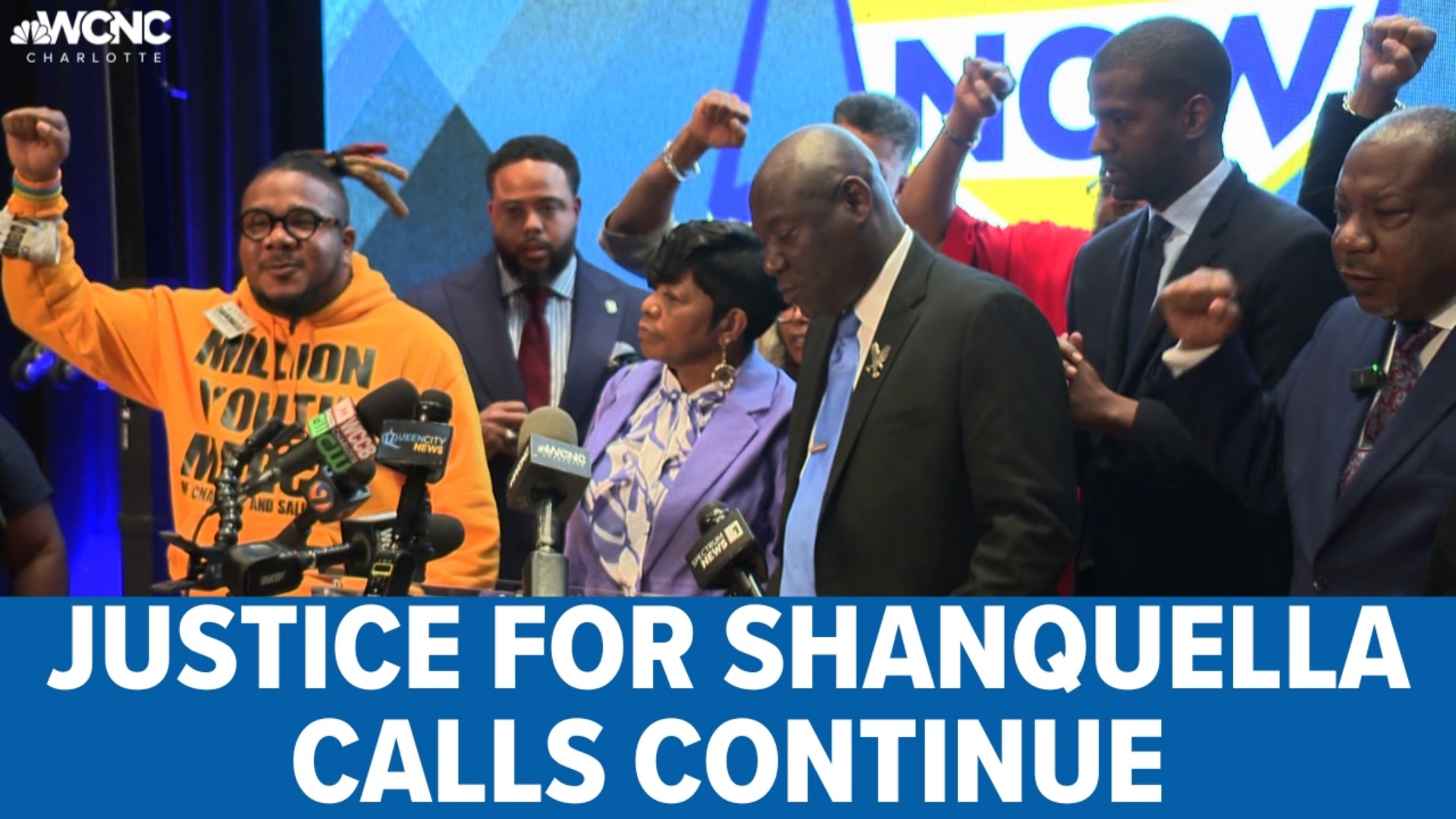SALISBURY, N.C. — After a panel about equal justice wrapped up on the campus of Livingstone College Thursday afternoon, Shanquella Robinson's family and their attorney have promised to continue to maintain pressure on federal authorities to either prosecute the people responsible for her death or extradite them to Mexico.
Ben Crump joined Robinson's family for a news briefing at the Music Room inside the Varick Auditorium on Thursday. Crump was joined by several civil rights advocates as well, who all shared similar demands for intervention at the national level.
Robinson, 25, was killed in October 2022 while vacationing in Mexico with other travelers. She died of a severe spinal cord injury suffered during her trip to Mexico with six other people. The FBI opened its own investigation into her death about a month later.
Mexican prosecutors have charged one of her companions with femicide, but so far no arrests have been made despite an active warrant existing. Authorities have said they're focused on finding the suspect they have a warrant for, seeking extradition. A red notice was also issued with Interpol, placing law enforcement across the world on notice.
Until recently, the American federal government didn't have much of a public response to Robinson's death abroad. But Crump said actions taken by Robinson's family and racial justice advocates in North Carolina are putting pressure.
"We have put the issue at the footsteps of the White House," Crump said in his opening remarks, aiming them at federal leaders like President Biden and Vice President Harris. "She was an American citizen. She was killed in a foreign land on video. We expect you to care about this Black woman as you would care about any woman killed on video."
During a daily news briefing on March 16, White House Press Secretary Karine Jean-Pierre was directly questioned about the case, the first time the White House addressed Robinson's death publicly. April D. Ryan, a reporter with TheGrio, pressed for more answers during the briefing.
Dawn Blagrove, the executive director for Emancipate NC, echoed Crump's sentiments Thursday, urging U.S. authorities to take action.
"We must remember that Black lives matter and that justice for Black lives matters," she said.
Rev. Greg Drumwright, a Greensboro pastor who leads the Justice 4 The Next Generation action group, promised to apply pressure as well, name-dropping Assistant U.S. Attorney General Kristen Clarke as among the federal leaders he promised to reach out to. He also paraphrased from Amos 5:24 in the Christian Bible, praying that "justice roll on" for Shanquella Robinson.


Mario Black, the founder and leader of the Million Youth March of Charlotte and Salisbury, said during Thursday's news briefing he had spent much time with the Robinson family. He touted public action taken during the last several months, including a letter-writing campaign that saw community members mail demands to both Mexican and American officials.
"President Biden, Vice President Harris: do the right thing," Black said. "No justice, no peace, arrest the Cabo Six."
Robinson's sister Quilla and mother Salamondra offered their own brief statements Thursday as well. For Quilla Robinson, she aired her frustrations with how much time has passed without American authorities making a definitive move.
"You've got all the evidence in the world," she said, referring to a viral video that showed Shanquella Robinson being brutally beaten at a Mexican resort. "Why are [the suspects] not in Mexico now?"
"What kind of system is this," Salamondra Robinson asked. "[The suspects] didn't even have a heart to do her like that."
It is possible for the United States to prosecute a case in other countries if it involves American citizens. The United States Code of Federal Regulations states if, "A person being a national of the United States, kills or attempts to kill a national of the United States while such a national is outside the United States, but within the jurisdiction of another country shall be punished."
However, the WCNC Charlotte Verify team notes such action requires approval by the U.S. Attorney General and the Department of Justice. If the same charge has already been adjudicated in the country that has jurisdiction, the U.S. can't prosecute. But the United States could prosecute for other offenses tied to the main offense.
As the Robinson family and advocates continue to demand answers, Crump promised Thursday there would be more public pressure on federal authorities to act, slamming a lack of response as "a shame before God" and promising "we make noise" about the case. He also drew a comparison to the disappearance of Natalee Holloway in 2005, saying the U.S. "did all kinds of stuff" when Holloway went missing in Aruba.
"This should be no different, no different at all," he said.
Crump and other advocates are expecting to meet with Sen. Bob Menendez (D - NJ), who sits on the Senate Foreign Relations Committee, to get more answers about what federal officials could do, be it taking up prosecution in the U.S. or extraditing the wanted suspect to Mexico. Crump also said Mexican authorities have offered concurrent jurisdiction to the U.S., which would allow an American prosecutor to handle the case.
Crump also said the National Bar Association, national Greek fraternities and sororities, and other groups were planning to make their own calls to action. He also encouraged Livingstone students to take on their own letter-writing campaign.

